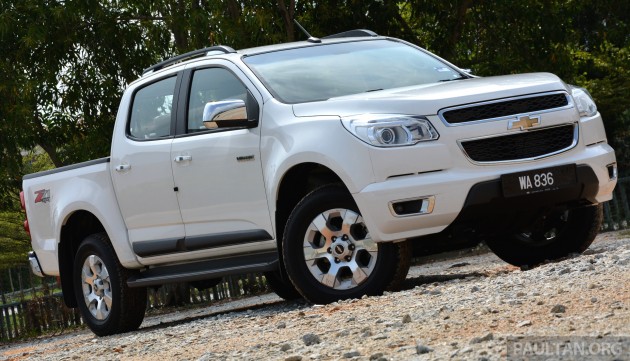GM International global restructuring
 |
| GM International cuts off lagging operations around the world |
| RELATED CONTENTS: | |
| GM pickup owners sue, alleging emissions cheating | |
| GM headed to China? | |
Cutting off India and Africa
According to a company announcement, following a 2013 extensive review of operations of GM International’s markets, the company is taking action to improve global business performance.
To this effect, GM will stop production of vehicles in its Indian manufacturing plant in Talegaon, Maharashtra state for domestic sales by the end of the year. Instead, the company will focus the facility’s full capacity for export production. On the other hand, current GM customers in India will continue to receive maintenance services.
Similarly, GM International’s operations in South and East Africa will see significant changes. According to the company announcement, it will stop selling cars in South Africa and sell its Struandale manufacturing plant in Port Elizabeth to Isuzu Motors. The transaction value has not been disclosed yet.
Additionally, Isuzu will buy 57.7 per cent of GM International’s East African operations, seizing management control.
According to GM’s estimates, through these actions, the company will realise annual savings of approximately $100 million and plans to take a charge of approximately $500 million in the second quarter of 2017.
“As the industry continues to change, we are transforming our business, establishing GM as a more focused and disciplined company,” said GM chairman and CEO Mary Barra. “We are committed to deploying capital to higher return initiatives that will enable us to lead in our core business and in the future of personal mobility.
“Globally, we are now in the right markets to drive profitability, strengthen our business performance and capitalise on growth opportunities for the long term. We will continue to optimise our operations market by market to further improve our competitiveness and cost base,” she said.
The actions to re-tailor production in India and sell operations in Africa seem to fall in with the company’s intentions of cutting off losing business lines and refocusing efforts on more promising ones.
In India, GM had been planning a $1 billion investment to boost domestic presence, but the company’s Chevrolet brand did not seem to be gaining market presence at the rate previously hoped for. GM’s market share fell below 1 per cent at the market in March 2017, prompting the decision to redirect production efforts for export to the company’s Mexican and Central and South American markets.
Similarly, GM’s South African operations have been going down the drain for a while now. According to South African Minister of Trade and Industry Rob Davies, as cited by newswire businesslive.co.za, while the company’s disinvestment is regrettable, it is not surprising.
According to him, the annual vehicle production at GM’s Struandale factory fell far short of the 50,000 units required to gain full access to the government’s automotive production and development programme.
While GM’s facility in Port Elizabeth has a capacity of 100,000 vehicles a year, in 2016, GM South Africa built 34,000 vehicles and the figure was not expected to rise in 2017.
According to the company announcement, Isuzu will purchase GM’s Struandale plant and GM’s remaining 30 per cent shareholding in their Isuzu Truck Africa joint venture. Isuzu will also purchase GM’s Vehicle Conversion and Distribution Centre and assume control of the Parts Distribution Centre.
GM will phase out the Chevrolet brand from the South African market by the end of 2017, and will continue to work with PSA Group to monitor Opel’s viability in South Africa.
Singapore will receive the smallest tweak in this round of restructuring. GM International will streamline the operations of its regional headquarters in Singapore. The unit will retain strategic oversight of the remaining business and markets, including Australia and New Zealand, India, Korea, and Southeast Asia.
Rapid growth in Vietnam
The Vietnamese automotive industry is looking at solid prospects, majorly propelled by passenger car sales.
Based on the 2016 December sales report of the Vietnam Automobile Manufacturers’ Association (VAMA), the total industry sold 304,427 units in 2016, up 24 per cent on-year. Of this, passenger cars accounted for the lion’s share and produced 27 per cent growth versus 2015. Commercial vehicles and special purpose vehicles, both taking up smaller segments of the market, reported growth rates of 25 and 33 per cent, respectively.
The VAMA report forecasted the automotive industry to grow by 10 per cent in 2017.
The market seems rather stable in terms of market share, with roughly five carmakers holding the majority with about 6-7 brands. Of these, Thaco emerges in clear dominance in terms of overall market share. Thaco, through its five manufacturing brands, make up around 40 per cent of the entire market since 2017, mainly through its Thaco Kia, Thaco Truck, and Vina Mazda production brands (12.1, 16.1, 11.8 per cent market share, respectively).
High performers in the Vietnamese automotive industry
| Maker | YTM April 2017 | market share (%) | YTM December 2016 | Market share (%) | YTM December 2015 | Market share (%) |
| Thaco* | 33,237 | 40 | 112,847 | 41.5 | 80,421 | 38.6 |
| Toyota | 17,672 | 21.8 | 57,036 | 21 | 50,285 | 24.1 |
| Ford | 9,470 | 11.7 | 20,011 | 10.7 | 20,740 | 9.9 |
| GM Vietnam | 3,783 | 4.7 | 9,726 | 3.6 | 7,345 | 3.5 |
| Honda | 3,524 | 4.4 | 11,501 | 4.2 | 8,312 | 4 |
*THACO includes THACO KIA, THACO BUS, THACO TRUCK, as well as Vina Mazda and Peugeot
Runners up at the second and third place are Toyota and Ford, with 21.8 and 11.7 per cent market share, coming far ahead of fourth and fifth ranking GM Vietnam and Honda.
Probably interesting from the aspect of GM International’s global restructuring efforts that GM Vietnam is looking at a rather successful beginning of 2017. During the first four months of the year, GM’s market share grew to 4.7 per cent from 2016’s 3.6, a 30.6 per cent increase, while the rest of the market grew at a more restricted pace: Toyota went from 21 to 21.8, Ford from 10.7 to 11.7, and Honda from 4.2 to 4.4 per cent, while Thaco actually fell from 41.5 to 40 per cent.
The 1.5 per cent reduction in Thaco’s slice of the pie is not attributable for any specific manufacturing brand under its name, as only Vina Mazda (the subsidiary responsible for Mazda passenger car sales) produced actual market growth, while other business lines slightly fell in tandem.
As the market for passenger cars grows, car brands like GM Vietnam are gaining ground on Thaco, which is specialised in utility and special purpose vehicles. Indeed, GM Vietnam outperformed competitors in terms of gaining market share, despite taking up a relatively small part of the total.
GM Vietnam’s Colorado LTZ pickup was the best performing model, with about 607 units from 3,783 sold in total this year until April. Close on its heels is the Cruze LS sedan (591 units) and the Cruze LTZ sedan (443 units).
Now it rides on GM Vietnam to keep up the impressive growth in sales and market share. If the firm manages and highlights itself as a promising business operation, it might just benefit from GM International’s restructuring.
 |
| GM's Colorado LTZ pickup was the manufacturer's most successful model so far this year |
What the stars mean:
★ Poor ★ ★ Promising ★★★ Good ★★★★ Very good ★★★★★ Exceptional
Latest News
More News
- NAB Innovation Centre underscores Vietnam’s appeal for tech investment (January 30, 2026 | 11:16)
- Vietnam moves towards market-based fuel management with E10 rollout (January 30, 2026 | 11:10)
- Vietnam startup funding enters a period of capital reset (January 30, 2026 | 11:06)
- Vietnam strengthens public debt management with World Bank and IMF (January 30, 2026 | 11:00)
- PM inspects APEC 2027 project progress in An Giang province (January 29, 2026 | 09:00)
- Vietnam among the world’s top 15 trading nations (January 28, 2026 | 17:12)
- Vietnam accelerates preparations for arbitration centre linked to new financial hub (January 28, 2026 | 17:09)
- Vietnam's IPO market on recovery trajectory (January 28, 2026 | 17:04)
- Digital economy takes centre stage in Vietnam’s new growth model (January 28, 2026 | 11:43)
- EU Council president to visit Vietnam amid partnership upgrade (January 28, 2026 | 11:00)
















 Mobile Version
Mobile Version